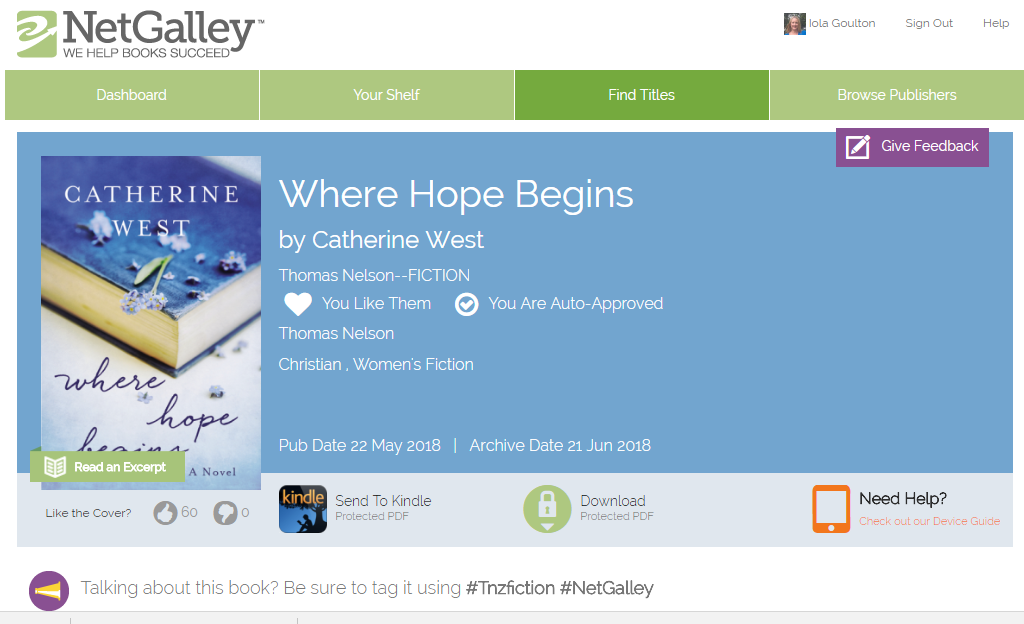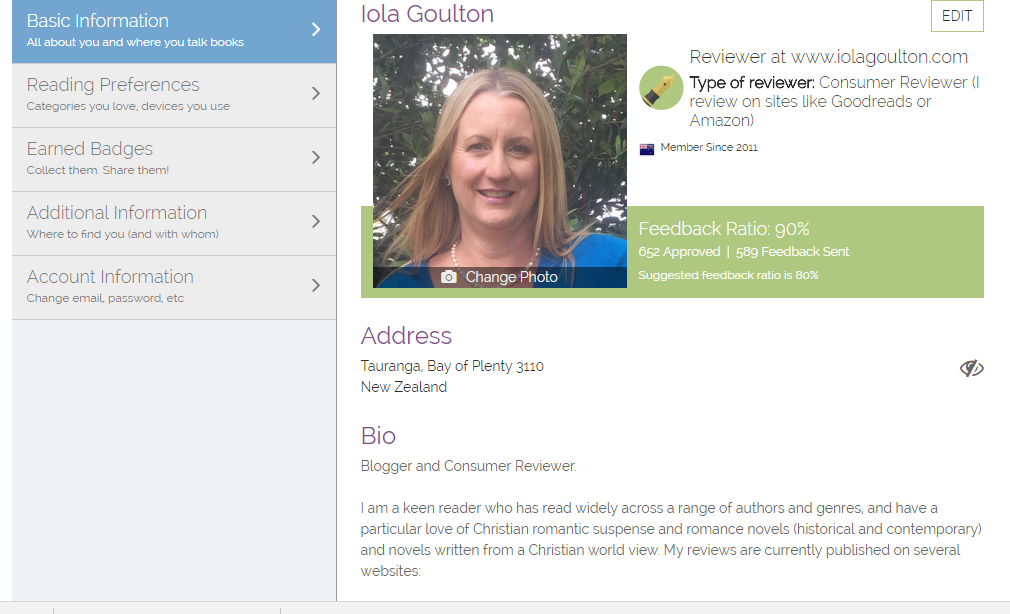This is a revised and updated version of a post that originally appeared at Australasian Christian Writers on 6 February 2015.
One of the big challenges facing new authors—especially self-published authors—is how to get book reviews. I’m working on a longer series on book reviews for later in the year, but today I’m going to introduce NetGalley, which is where I get most of the books I review.
What is NetGalley?
NetGalley is a service to provide “professional readers”, including book bloggers like me, with electronic versions of upcoming releases. Trade publishers have produced paper Advance Review Copies (ARCs) for years, mailing them to newspapers, magazines and key review sites and influencers in the hope of gaining favourable pre-publication reviews. Amazon led the rise of the customer reviewer, and the Kindle made expensive paper versions even more of a luxury. Why mail paper, when you can email a file?
This is where services like NetGalley come in, providing secure electronic ARCs to over 370,000 booksellers, media, librarians, educators and reviewers who use NetGalley. Around 50% of users visiting the site more than nine times a month (I admit: I am one of those).
How Does NetGalley Work for Authors?
Publishers list titles with NetGalley and provide an electronic version of the book, the cover image, book description, and details such as price and release date. They also have the option of uploading social media links, a marketing plan, and advance praise (although most don’t. That’s why they’re on NetGalley: to garner advance praise).
Publishers pay an initial set-up fee plus a monthly fee depending on the number of titles they offer. Each title gets its own page:

What Does It Cost?
Self-published authors can also list through NetGalley, either individually or through a co-operative. An individual listing is $450 for six months for one book. A co-op listing will depend on the terms of the cooperative, but can be as little as $50 for a one-month listing for a single book, to an annual membership which allows for multiple books for around $350. Twenty authors are needed to form a co-op, with one person responsible for setup and administration.
Authors who are members of the Independent Book Publishers Association can get a $50 discount on either the basic six-month listing, or Marketing-plus-Title listing. This includes a single listing in any scheduled NetGalley newsletter.
I suspect the additional fee might not represent good value for money—personally, I’ve opted out of the ‘push’ email list, as it was mostly advertising general market titles I wasn’t interested in. Before signing up for this additional service, I’d want to how many of the 370,000 users have opted in to receiving the relevant newsletter, and how many of those regularly request Christian books.
In either case, publishers can choose whether to make their book available to anyone who requests it, or to screen requests. NetGalley shows publishers how many requests, downloads and reviews a title has, and publishers can vet each review request before making a decision (for example, to weed out reviewers who have a low average review rating, who have a low review-to-request ratio, or who don’t typically review in that genre). Authors can do this by checking out individual reviewer profiles:

How Does NetGalley Work for Reviewers?
I’ve been a NetGalley reviewer since late 2011, and have so far requested over 650 titles and provided feedback on over 90% of them (NetGalley keep good statistics!). I can search for books by title or author (for example, when I hear about a new release from one of my favourite authors), by publisher, or by genre (e.g. Christian). I can also select my “Favourite Publishers”, or “Auto-Approvals”, which is a list of publishers who have checked me out and now allow me to read any of their titles.
It’s easy to use: I request a title, and if I’m auto-approved, I’m immediately given the option to Send to Kindle, or download to another ereader (NetGalley supports all major ereaders). If I’m not auto-approved, the book goes to my “Pending” list, and I’ll get an email to advise me whether my request has been accepted or rejected. The longer I’m a reliable NetGalley reviewer, the more titles I am approved to read.
Publishers can also create a widget to send to potential reviewers e.g. reviewers participating in an online blog tour.
And we get badges.
What Else do I Need to Know?
Getting your genre right is important:
I search exclusively on my favourite publishers, and on “Christian” (which includes fiction and non-fiction). Authors can include more than one genre, so a Christian Romance should be categorised under both.
Listing with NetGalley isn’t paying for reviews:
NetGalley doesn’t pay reviewers. What your fee is paying for is the online system which provides direct access to over 210,000 reviewers for a specified period of time.
NetGalley doesn’t guarantee results:
It doesn’t (and can’t) guarantee a certain number of reviews, nor does it guarantee positive reviews. NetGalley acts as an intermediary between the author/publisher and reviewer, which means reviewers are less likely to sugarcoat their review of a book.
Authors have different experiences of NetGalley:
Keary Taylor had over 1,200 requests for her novel, The Bane. This lead to over 400 reviews posted through NetGalley, and more posted on blogs, retail sites such as Amazon, and reader sites such as Goodreads. All reviews posted through NetGalley are also posted online in at least one other location (personally, I post reviews to between five and ten separate sites, if the book is listed on those sites).
Susan Quinn had equally impressive results for the romance co-operative she organised. She uploaded eleven titles when the co-op first went live, and within the first day had 446 approved requests, 286 downloads and one review. After a week, they had nineteen titles uploaded, 2,216 approved requests and 36 reviews.
In contrast, Heather Day Gilbert didn’t find it useful. She only got a few reviews, perhaps because she listed through a co-op that primarily offers romance novel (she describes God’s Daughter as a love story rather than a romance). Melissa Pearl had a similar experience, with only four reviews from 200 approvals.
Reviews won’t come in immediately:
It can take me anything between one and four months to post a review, depending on my blogging schedule (and some have taken me much longer, for various reasons). I believe authors should list their book three months before release, as this maximises the chance of getting reviews at or around release date.
Overall, NetGalley is about getting reviews, not selling books.
However, getting reviews is an important aspect of a marketing strategy, especially for ebooks. Amazon users are more likely to purchase books with significant numbers of reviews, especially when they can see a range of reviews, including some with low star ratings. It’s not cheap and the results can vary, but it is a marketing tactic worth considering.
For readers, it’s great. Most of my favourite publishers are on NetGalley, which means I get first look at their new books, and am able to find and recommend new books and new authors.



